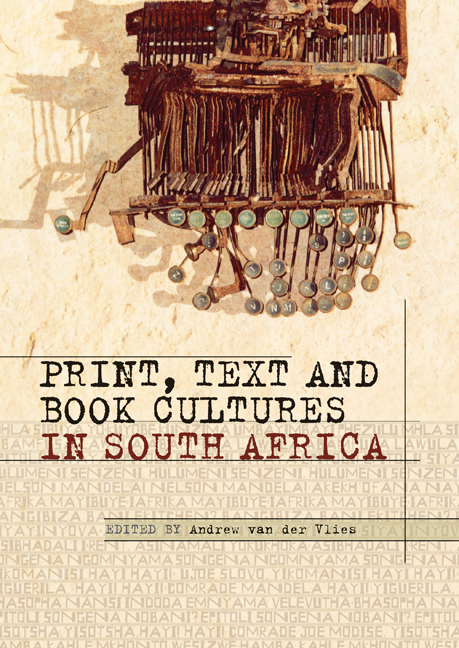Book contents
- Frontmatter
- Contents
- Acknowledgements
- Abbreviations and acronyms
- 1 Introductory
- 2 Print Cultures and Colonial Public Spheres
- 3 Local/Global: South African Writing and Global Imaginaries
- 3.1 Deneys Reitz and Imperial Co-option
- 3.2 “Consequential Changes”: Daphne Rooke's Mittee in America and South Africa
- 3.3 Oprah's Paton, or South Africa and the Globalisation of Suffering
- 4 Three Ways of Looking at Coetzee
- 5 Questions of the Archive and the Uses of Books
- 6 Orature, Image, Text
- 7 Ideological Exigencies and the Fates of Books
- 8 New Directions
- Contributors
- Index
3.3 Oprah's Paton, or South Africa and the Globalisation of Suffering
from 3 - Local/Global: South African Writing and Global Imaginaries
Published online by Cambridge University Press: 21 April 2018
- Frontmatter
- Contents
- Acknowledgements
- Abbreviations and acronyms
- 1 Introductory
- 2 Print Cultures and Colonial Public Spheres
- 3 Local/Global: South African Writing and Global Imaginaries
- 3.1 Deneys Reitz and Imperial Co-option
- 3.2 “Consequential Changes”: Daphne Rooke's Mittee in America and South Africa
- 3.3 Oprah's Paton, or South Africa and the Globalisation of Suffering
- 4 Three Ways of Looking at Coetzee
- 5 Questions of the Archive and the Uses of Books
- 6 Orature, Image, Text
- 7 Ideological Exigencies and the Fates of Books
- 8 New Directions
- Contributors
- Index
Summary
In February 2003 Oprah Winfrey announced that she would be reviving her Book Club (which had been suspended for about a year) in a new format. Tentatively entitled Traveling with the Classics, the revamped club would no longer confine itself to contemporary fiction, but would take its picks from the “great reads that have stood the test of time” (Zanoza 2003, 13). The decision to turn to the masterpieces of world literature represented a recognition on the part of Harpo Inc., Oprah's vast multimedia company, of its considerable international reach. The new conception, furthermore, seemed to hint at an attempt to shift away from the earlier show's focus on authors towards a focus on context and place: on the geographical and social contexts from which the selected “classics” arose. But the reconceptualisation of the Book Club must also be seen in business terms. It was but one in a series of calculated moves by Winfrey and her company to leverage her cultural capital and image—an image that is not necessarily distinct from the real Oprah Winfrey, whose ragsto- riches biography is the corporation's most important intellectual property.
In the mid-1990s The Oprah Winfrey Show found itself in competition with an ever-growing throng of competitors, each eliciting more and more sensational public revelations of American lives gone wrong. To distinguish herself from these, Winfrey decided to turn her back on what she herself termed “trash TV” and to devote herself, with great earnestness and intensity, to the more uplifting aspects of life (Travis 2007, 1026). The transformation was staged—as is so much in Winfrey's diligently examined life—as a psychic event of sorts. As she confessed to interviewers, the subject matter of the show (school violence, teenage substance abuse, dysfunctional families and the like) was starting to get her down and she resolved to stake out a new course: to lighten the mood of day-time television, to have more fun, and, most importantly, to do good. She would henceforth use her show as a kind of ministry, a bully pulpit from which to encourage her viewers to “create the highest vision of themselves” (Blewster 1998, 22).3 Oprah's Book Club, founded in 1996, was part of this venture.
- Type
- Chapter
- Information
- Print, Text and Book Cultures in South Africa , pp. 140 - 164Publisher: Wits University PressPrint publication year: 2012

